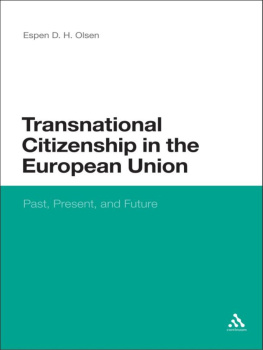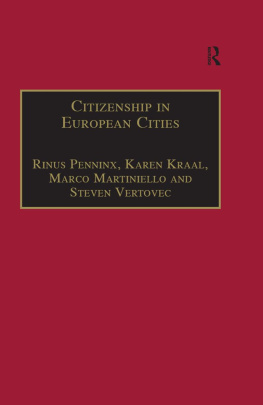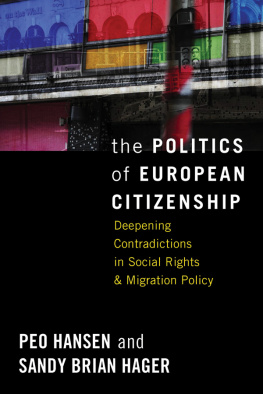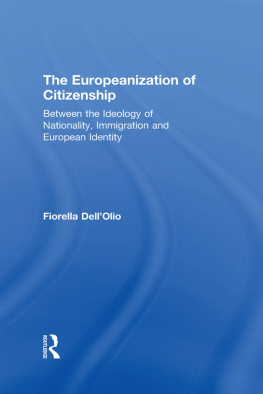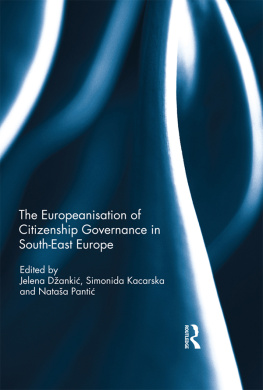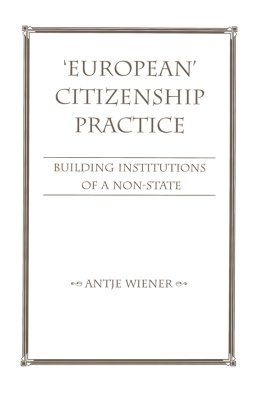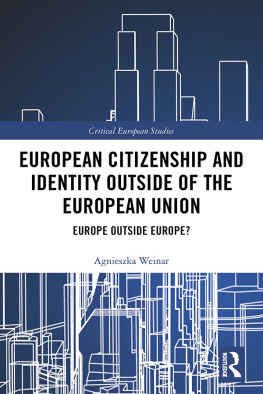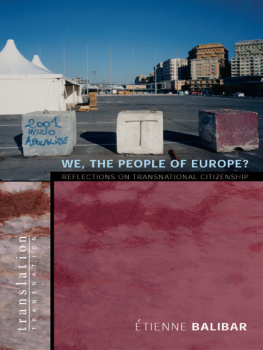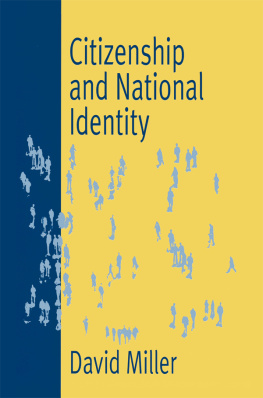Transnational Citizenship
in the European Union
Transnational Citizenship
in the European Union
Past, Present, and Future
Espen D. H. Olsen
Continuum International Publishing Group
The Tower Building, 11 York Road, London SE1 7NX
80 Maiden Lane, Suite 704, New York, NY 10038
www.continuumbooks.com
Espen D. H. Olsen, 2012
All rights reserved. No part of this book may be reproduced, stored in a retrieval system, or transmitted, in any form or by any means, electronic, mechanical, photocopying, recording, or otherwise, without the permission of the publishers.
ISBN: 978-1-4411-7999-9
Library of Congress Cataloging-in-Publication Data
A catalog record of this book is available from the Library of Congress
Contents
List of Abbreviations
| EC | European Community |
| ECJ | European Court of Justice |
| ECHR | European Convention on Human Rights |
| ECSC | European Coal and Steel Community |
| EEC | European Economic Community |
| EMU | Economic and Monetary Union |
| EP | European Parliament |
| EU | European Union |
| IGC | Intergovernmental Conference |
| MEP | Member of the European Parliament |
| SEA | Single European Act |
| TEU | Treaty on European Union |
Foreword
I write these words six weeks after the terrible tragedy of right wing terror against government buildings in Oslo and cold-blooded assassination of young Labor Party politicians at Utya, Norway. Finishing this book has not been easy in the immediate aftermath of such a disaster. I have friends who were directly involved and I have myself been at the Utya camp as a young political activist. Who cares about detailed academic debates on transnational citizenship and European rights in times like these? I have thought about this question in the final stages of preparing this book. My conclusion is that all fact-based, balanced and engaged accounts of the current state of European politics must be welcome in this situation. Understanding the development of citizenship, rights, and identity is as important as ever. The politics of citizenship frame human beings in relation to political institutions. Mechanisms of inclusion and exclusion highlight the degree of openness and closure of political communities. The more we know about these issues, the easier it will be to maintain a sound and fair debate on immigration, identity, and human dignity in contemporary Europe. As a discursive interpretation of transnational citizenship in the EU, this book is one small contribution to the academic and political debates on these issues.
The journey of this book started in December 2003 when my friend and later colleague Agustn Jos Menndez encouraged me to apply for a doctoral position at the European University Institute (EUI) in Florence, Italy. I thought this would be a nonstarter but it turned out I was wrong. At the EUI, I was fortunate to be able to work with Friedrich Kratochwil as a supervisor and mentor on the dissertation that this book is based on. His incisive comments bear an important footprint also on this book although he has not been directly involved this time around.
I have been privileged to work at ArenaCentre for European Studies, University of Oslo in the four years since I left Florence and the EUI. Arena is a highly stimulating and diverse research institution that is a constant source of inspiration. Thanks to good colleagues and an efficient administration, Arena is a good place to do research. I thank them all for the good and interesting times in the past few years. None mentioned, none forgotten.
In preparing the book I have been fortunate to have Marie-Claire Antoine as my editor with Continuum. I thank her and two anonymous referees for comments. Marie-Claire is a forthcoming editor who answers any question, no matter how stupid it may be, with efficiency and clarity. I must also thank Haakon Ikonomou for valuable research assistance in the final stages of preparing the manuscript.
Life is not all about writing books and academic papers. I am fortunate to have a fantastic family to come home to each day. My wife Silje and our two sons Teodor and Nilas are always there to support me. They endure my mood swings, absent-minded moments, and occasional evenings in the office with a smile and for that they deserve my eternal gratitude! This chapter of my academic life is now finally over and after a brief respite they might have to endure yet others. Knowing that they are always there to cheer me on and make me laugh makes it easy to go into new projects for the future.
Espen D. H. Olsen
Oslo, Norway
September 8, 2011
Introduction: The Challenge of
European Citizenship
Ever Closer Union! Postnational Europe! When the Treaty on European Union (TEU) was signed in 1991 after lengthy negotiations, it contained not only extensive changes in policy areas that the new Union would take up; it also created Citizenship of the Union. Despite the rather dry and formalistic language of the Treaty provisions on citizenship, this was heralded as a major stepping stone toward a more democratic and legitimate EU. Not only that, prominent actors in political elites, EU institutions, and among academics argued that the construction of citizenship beyond the nation-state amounted to new postnational era in European politics (see e.g. Curtin 1997; Gerstenberg 2001; Habermas 1996; 1998; 2000; Preuss 1998a). Finally, they argued, citizenshipa defining feature of the modern statewas to throw off the shackles of the nation-state. But the notion of citizenship in the EU also had its detractors. Theorists argued that to conceive of citizenship outside the framework of the nation-state was impossible (see e.g. Grimm 1995; Miller 1995; Shore 2004; Smith 1992). Not only that, citizens also reacted. The Danish no to the TEU in a referendum was widely attributed to dissent on the issue of further political integration, symbolically framed by European leaders and institutions in the idea of European citizenship.
A central theme, then, of European integration in the past 20 years, the question of European citizenship is important, not only as part of a scholarly debate linking it to the broader question of political order in the EU, but also as a real-world phenomenon that affects the lives of citizens. As the primary organizing principle that relates individuals to a political community, citizenship is of unrivalled importance for the life chances of human beings on a national, regional, and global scale. The difference between citizens and noncitizens is most clearly visible in differences in the benefits and burdens that citizenship entails in concrete political practices. In the European context, this is especially important as individual rights are intimately linked with the overall aims of integrationwhether they are market-oriented, political, or cultural.
A unifying theme of European integration has been to fight the excesses of nationalism that plagued Europe in the two World Wars. In a postwar context of reconciliation and rebuilding, the European project of unification commenced with integrative measures pertaining to national economies and markets focusing on aims such as free movement and reduction of tax barriers. At the time of increasing migration flows in the 1960s and 1970s, European institutions brought in questions of identity, communal symbols, and genuine European elections. After the fall of the Berlin Wall, the Union became a reality and took on issues such as foreign and security policy and migration. In the last decade, the EU has enlarged to the East. And finally its institutions, member states, and citizens have addressed the question of what are we? as a political community in the drawn-out debates on a European constitution.

